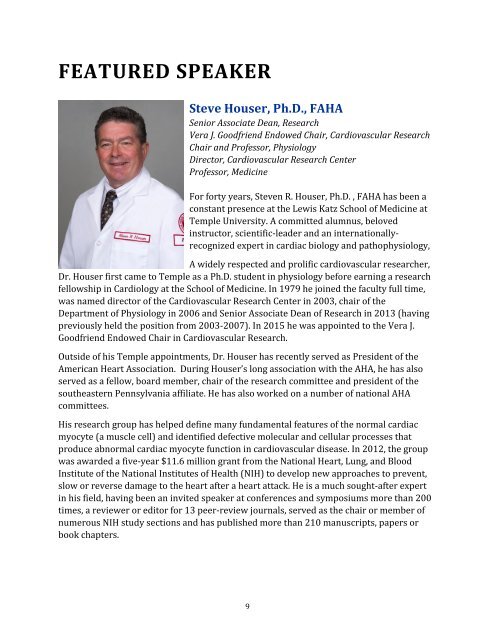2017 Cardiovascular Research Day Abstract Book
Create successful ePaper yourself
Turn your PDF publications into a flip-book with our unique Google optimized e-Paper software.
FEATURED SPEAKER<br />
Steve Houser, Ph.D., FAHA<br />
Senior Associate Dean, <strong>Research</strong><br />
Vera J. Goodfriend Endowed Chair, <strong>Cardiovascular</strong> <strong>Research</strong><br />
Chair and Professor, Physiology<br />
Director, <strong>Cardiovascular</strong> <strong>Research</strong> Center<br />
Professor, Medicine<br />
For forty years, Steven R. Houser, Ph.D. , FAHA has been a<br />
constant presence at the Lewis Katz School of Medicine at<br />
Temple University. A committed alumnus, beloved<br />
instructor, scientific-leader and an internationallyrecognized<br />
expert in cardiac biology and pathophysiology,<br />
A widely respected and prolific cardiovascular researcher,<br />
Dr. Houser first came to Temple as a Ph.D. student in physiology before earning a research<br />
fellowship in Cardiology at the School of Medicine. In 1979 he joined the faculty full time,<br />
was named director of the <strong>Cardiovascular</strong> <strong>Research</strong> Center in 2003, chair of the<br />
Department of Physiology in 2006 and Senior Associate Dean of <strong>Research</strong> in 2013 (having<br />
previously held the position from 2003-2007). In 2015 he was appointed to the Vera J.<br />
Goodfriend Endowed Chair in <strong>Cardiovascular</strong> <strong>Research</strong>.<br />
Outside of his Temple appointments, Dr. Houser has recently served as President of the<br />
American Heart Association. During Houser’s long association with the AHA, he has also<br />
served as a fellow, board member, chair of the research committee and president of the<br />
southeastern Pennsylvania affiliate. He has also worked on a number of national AHA<br />
committees.<br />
His research group has helped define many fundamental features of the normal cardiac<br />
myocyte (a muscle cell) and identified defective molecular and cellular processes that<br />
produce abnormal cardiac myocyte function in cardiovascular disease. In 2012, the group<br />
was awarded a five-year $11.6 million grant from the National Heart, Lung, and Blood<br />
Institute of the National Institutes of Health (NIH) to develop new approaches to prevent,<br />
slow or reverse damage to the heart after a heart attack. He is a much sought-after expert<br />
in his field, having been an invited speaker at conferences and symposiums more than 200<br />
times, a reviewer or editor for 13 peer-review journals, served as the chair or member of<br />
numerous NIH study sections and has published more than 210 manuscripts, papers or<br />
book chapters.<br />
9


